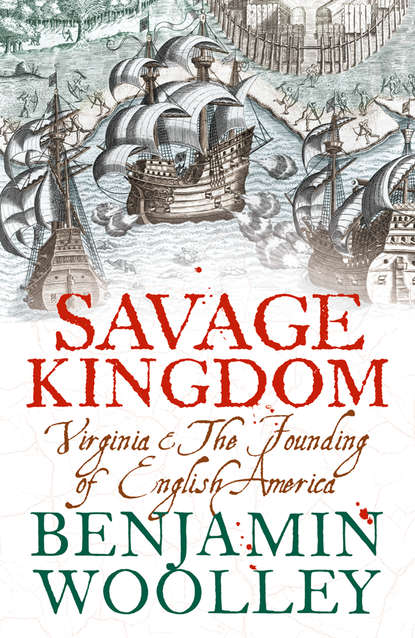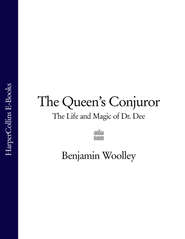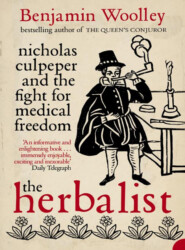По всем вопросам обращайтесь на: info@litportal.ru
(©) 2003-2024.
✖
Savage Kingdom: Virginia and The Founding of English America
Настройки чтения
Размер шрифта
Высота строк
Поля
The man White now beheld was not the one who just a year ago had stood alongside him on the dockside at Deptford, awaiting departure to the New World. He was undernourished, badly injured and terrified for his life. For some reason, he had aroused fury in his captors. They violently jostled him towards the campfire, where Opechancanough awaited him.
White was an obvious candidate to act as interpreter in the subsequent interrogation. Casson, it transpired, had been caught at Appocant, a village lower down the Chickahominy. The vessel used by the English for exploration had been found anchored there, with Casson left on board to guard it. He had been ‘enticed’ ashore by some women from the village, and then captured.
(#litres_trial_promo) The reaction of his captors suggested he might have attacked or even raped one of the women.
Opechancanough was already aware that one of the English captains had entered his territory. This Otasantasuwak or one-who-wears-trousers had come into the Powhatan heartlands not with the stealth of an Indian, but like a lumbering pachyderm, crashing through the trees, scattering flocks of birds and herds of woodland creatures before him. The same man had already engaged in several raids up the James and Chickahominy for food, Quiyoughcohannock being among the targets.
(#litres_trial_promo)
Casson had little more to add, other than pathetic appeals for clemency, and the name of the captain: John Smith. This information extracted, he was stripped of his clothes until he stood naked before the gathering assembly of men, women and children, his front frozen by the winter chill, his back heated by the crackling fire. Two wooden stakes were driven into the ground either side of him, to which his ankles and wrists were bound.
Opechancanough continued to interrogate the terrified captive about this captain’s intentions. A warrior or priest then approached, brandishing mussel shells and reeds. Using the edges of the shells as blades, and the reeds as cheese-wires, the executioner systematically set about cutting through the flesh and sinews of Casson’s joints, stretched out between the staves. As each of his limbs was removed, it was cast upon the fire, until only his head and trunk were left, writhing helplessly on the blood-soaked ground.
Turning the torso over, so Casson faced the ground, the executioner carefully cut a slit around the neck, then slipped a mussel shell beneath the skin. He proceeded to ease off the scalp, and, turning the body back over again, gently unpeeled Casson’s face from the skull. He then slit open Casson’s abdomen, and pulled out his stomach and bowels, which steamed in the cold winter air. Casson’s remains then joined the rest of his body to burn on the fire, until only his dried bones were left, which, according to White, were gathered up and deposited in a ‘by-room’ in one of the tents.
(#litres_trial_promo)
The punishment of being hanged, drawn and quartered was well-known in Europe, being reserved as retribution for the worst crimes against the monarch. The Indian equivalent was, if anything, more refined in its brutal theatricality. It was not the usual form of capital punishment (murderers were beaten to death with sticks, thieves knocked on the head), and there are only two instances of its use recorded in Virginia. It may have been reserved for foreigners, or for particular crimes, or, in the case of Casson, to be witnessed by an outsider – a lurid warning to share with his countrymen when, in terror, he ran back to them.
(#litres_trial_promo)
White trekked or canoed the difficult twenty-five miles from Rassaweck to Jamestown, and staggered into the fort to find not the refuge he would have hoped for, but a midden of disease and destitution. The council was too weak to discipline the young man. Instead he was debriefed, in the hope that his experience of life with the Indians would reveal their motives and intentions. The terrifying finale of Casson’s torture and execution demonstrated that such hopes were in vain.
Soon after, members of Smith’s party somehow made their way back to the fort with news that they had lost contact not only with several members of their company, but Smith himself, who had disappeared further upriver in a canoe. A search party was sent soon after to discover Smith’s fate, and returned with the corpses of Emry and Robinson, the latter found with as many as thirty arrows in his body. Of Smith, there was no sign. The settlers must have feared – and some of them hoped – for the worst.
At around the same time, Ratcliffe appointed Gabriel Archer to the council. He did this without John Martin’s consent, and despite howls of protest coming from Wingfield’s cabin in the pinnace.
The winter had by now set in with a vengeance, the onset, research has subsequently revealed, of a ‘Little Ice Age’ that plunged the northern hemisphere into one of the coldest spells for centuries. In London, one of the Thames’s rare ‘frost fairs’ was in progress, the river freezing over so firmly that innumerable booths were soon to be found ‘standing upon the ice, as fruitsellers, victuallers, that sold beer and wine, shoe makers and a barber’s tent’.
(#litres_trial_promo) Virginia was on the same latitude as southern Spain, and the English had assumed the climate would be similarly Mediterranean. Now they were learning otherwise, and as they endured the bitter night frosts in their drafty tents, and snow flurries during the day, most assumed Smith must have died of exposure, if he had not been tortured and killed by the Indians.
(#litres_trial_promo)
One particularly cold day, when the ground was encrusted by a thick hoar frost and snow danced in the air, three lightly clad warriors stepped nimbly out of the forest and approached the fort. Guards chased them off, but as night fell, they returned, and were discovered to be carrying a piece of paper torn from a notebook. It bore a message from Smith.
The note revealed that Opechancanough, the chief Archer had dismissed as a fool at ‘Pamunkey’s Palace’, had taken him prisoner. Smith wrote that he had been offered ‘life, liberty, land and women’ if he provided information on Jamestown’s defensive weaknesses, which must mean that a full-scale attack on the fort was being planned. He ordered the soldiers to let off some of the field artillery, to demonstrate to the messengers the strength of English arms.
The message also listed a series of articles which the messengers were to take back with them. They had been told before their departure what had been asked for, so were intrigued to see these very items produced, as though Smith ‘could either divine or the paper could speak’.
(#litres_trial_promo)
As Ratcliffe, Martin, Percy and the others watched the messengers run back into the forest, the camp was seized by a sense of common purpose. A thorough review of defences was ordered. A gruelling roster was drawn up for the watch, each man bearing arms to serve once every three days, watching all night ‘lying on the bare cold ground, what weather soever came’, and all the following day, ‘which brought our men to be most feeble wretches’. Smith’s expeditions up the Chickahominy, one or two undertaken by Martin, and the abundance of fish and waterfowl had eased the food situation, allowing some further reinforcement of the fort’s defences, as well as the construction of a few huts and common buildings.
On 2 January 1608, a company of warriors came out from the woods, two carrying baskets, another a coat and a knapsack, another walking alongside an Englishman. Even in the gloomy dawn of a January morning, guards could tell from the stocky frame and bushy beard that the Englishman was John Smith, and that the men around him were not captors, but an escort.
(#litres_trial_promo)
Smith marched into the fort and immediately ordered the guard to fetch a millstone and two demi-culverins for the Indians to take home. Puzzled at what on the face of it was a violation of the instruction preventing the Indians having access to English arms, they duly produced the items, and Smith was able to amuse himself as the Indians struggled to lift the stone and five tons of cannon. Once they had given up, he ordered that the culverins be charged and loaded with stones. They were fired into a nearby copse of trees ‘loaded with icicles’, and the ‘ice and branches came so tumbling down that the poor savages ran away half dead with fear’.
Smith’s dramatic reappearance provoked a mixed response. ‘Each man with the truest signs of joy they could express welcomed me,’ was Smith’s recollection, ‘except Master Archer and some 2 or 3 of his [friends].’ Archer, exercising his questionable powers as a councillor, called for Smith’s arrest ‘for the lives of Robinson and Emry’, the two men killed by the Indians while accompanying Smith into the upper reaches of the Chickahominy.
(#litres_trial_promo)
Archer insisted that Smith be tried for the charges ‘upon a chapter in Leviticus’. This curious choice of legal device hints that Smith, who had returned full of excited talk of pagan rites, comely queens and Indian embraces, was suspected of some sexual impropriety with his captors, which provided a pretext for avenging the death of his two companions.
(#litres_trial_promo)
Whatever the purpose behind the charges, they resulted in Smith being tried the day of his return. He was pronounced guilty, and in sentencing denied even the dignity of a soldier’s death before a firing squad. The rope was once more flung over the tree branch, the ladder once more propped up against the trunk. ‘But it pleased God,’ wrote Wingfield, ‘to send Captain Newport unto us the same evening, to our unspeakable comforts; whose arrival saved Master Smith’s life.’
NINE True Relations (#ulink_ad9a5732-e247-59af-91ca-a0e15b8903ec)
NEWPORT’S ‘GOOD TALL SHIP’ the John & Francis arrived at Jamestown on 2 January 1608. The crossing had taken three months, a stop at Dominica providing a chance to supplement the stores brought from England with a variety of more exotic goods, such as potatoes, bananas and pineapple, plus some parrots, to entertain the settlers, if not to feed them. Though the arrival of so many more mouths to feed must have aroused some apprehension, the belated fulfilment of Newport’s promise to return was met with relief and delight, spoiled only by the news that the consort vessel the Phoenix, under the mastership of Captain Francis Nelson, had gone missing in fog just 30 or so miles from the mouth of the Chesapeake.
(#litres_trial_promo)
As soon as he was ashore, the admiral set about re-establishing his authority. As well as halting Smith’s execution, he released Wingfield from the pinnace, and stopped Archer calling a ‘parliament’, an assembly of all the settlers, which he may have tried to summon in a final attempt to overthrow Smith. Newport confirmed Smith’s membership of the council, but stripped him of the office of cape merchant, that job being given to one of the new arrivals, John Taverner. Smith no doubt resented the demotion, not least because it weakened his claim to being in charge of relations with the Indians.
Another newcomer, Matthew Scrivener, ‘a very wise, understanding gentleman’, was sworn in as a new councillor. John Martin was put in charge of recovering the correct sample of gold-bearing earth to take back to England. Percy, meanwhile, remained on the sidelines. Despite the council’s lack of numbers, he was still discounted from office.
(#litres_trial_promo)
Newport also took swift steps to improve the lot of the long-suffering settlers. He commanded his crew to set about building a ‘fair storehouse’ for the bounties brought from England, a ‘stove’ or warm room to provide respite from the cold, and a proper church, no doubt to the delight of the neglected chaplain Hunt.
The relief was short-lived. On 7 January, a fire swept through the fort, which destroyed all but three of the existing buildings, together with the palisades, ammunition, clothes, food supplies and Preacher Hunt’s library of books. One of the new settlers, Francis Perkins, ‘gentleman’, who had arrived with his son, also Francis, ‘labourer’, was distraught to discover that all their possessions had perished, except for a mattress, which had yet to be unloaded from the ship. Meanwhile, President Ratcliffe was badly hurt in a shooting accident, his pistol blowing up as he attempted to fire it. It ‘split his hand’, leaving him with injuries that would take months to heal.
(#litres_trial_promo)
After such a setback, the settlers needed a distraction from their woes, and Smith readily supplied it, by telling them the extraordinary ‘relation’ of his capture by the Indians, and his meeting with the great Powhatan. It was a story that only he could tell. But it would revive their ‘dead spirits’, he promised, as well as capture imaginations for generations to come.
Captain Smith’s Relation of his being Taken Prisoner by the Indians, how they Conjured Him, Powhatan entertained Him, would have slain him, and how his daughter saved his life
Вы ознакомились с фрагментом книги.
Приобретайте полный текст книги у нашего партнера:
Приобретайте полный текст книги у нашего партнера:







